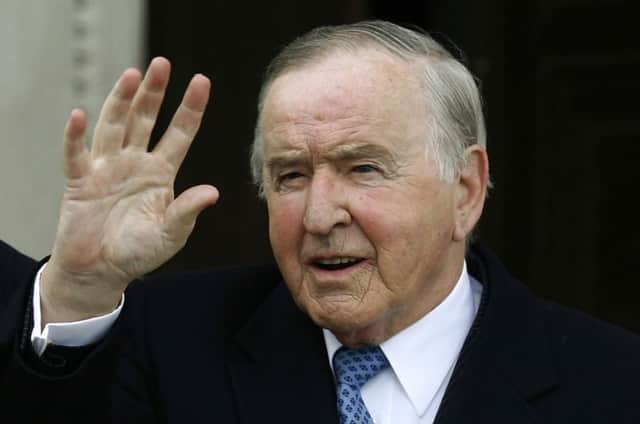Tributes paid to Irish taoiseach Albert Reynolds


Tributes have been paid to the 81-year-old for the risks he took to make the seemingly impossible happen in Northern Ireland and secure the legacy of the peace process.
Mr Reynolds’s elder son Philip told Ireland’s state broadcaster RTE this morning that he died overnight.
Advertisement
Hide AdAdvertisement
Hide AdThe family confirmed last year that he had been suffering from Alzheimer’s disease.
Mr Reynolds is survived by his wife Kathleen, two sons and five daughters.
Sir John Major, who signed the 1993 Downing Street Delcaration with Mr Reynolds that paved the way for the Good Friday Agreement and lasting peace, remembered him as the leader who made things happen.
In a heartfelt message, the former prime minister described him as a friend and a politician deserving of his place in history.
“Albert Reynolds was at the heart of the success of the Irish peace process. Without Albert, it may never have started - or might have stalled at an early stage - and Ireland, North and South, might still be enduring the violence that scarred daily lives for so long,” Mr Major said.
“Albert cared about achieving peace and took risks to deliver a future for Ireland that many thought was impossible. He deserves an honoured place in the history of his country.
“To me, he became a friend I cherish and will miss.”
Career
Born in November 1932 in Rooskey, Co Roscommon, he was elected to the Irish parliament in 1977 and went on to become taoiseach in February 1992 in a coalition government.
Mr Reynolds’s party was Fianna Fail. He led the centre-right republican group in two coalition governments and challenged others, including Sir John, to back his talks with Sinn Fein.
Advertisement
Hide AdAdvertisement
Hide AdHe served less than three years as leader in Ireland and, after surviving a series of political scandals, it was the mishandling of the extradition of paedophile priest Brendan Smyth that brought his time at the top to an end.
Mr Reynolds was a businessman, showband promoter, politician and deal-maker.
Taoiseach Enda Kenny expressed his sympathies with the family.
“Albert Reynolds brought an energy and drive to the development of business and economic growth during his tenure in office as minister for industry and as minister for finance,” Mr Kenny said.
“As taoiseach, he played an important part in bringing together differing strands of political opinion in Northern Ireland and as a consequence made an important contribution to the development of the peace process which eventually led to the Good Friday Agreement.”
President of Ireland Michael D Higgins said Mr Reynolds was a dynamic minister and a courageous leader.
“Former Taoiseach Reynolds was committed to serving the people of Ireland with all of his energy. It is appropriate that we pay tribute to his significant contribution to our contemporary society,” the president said.
Stuart Dwyer, charge d’affaires at the US embassy in Dublin, said: “As leader during some of the most difficult moments of conflict in Northern Ireland he found a way towards a solution.
Advertisement
Hide AdAdvertisement
Hide Ad“The investment that he and others made in the process set the stage for the critical breakthroughs of 20 years ago this month. We remember him as one of the architects of the peace we see today, even if work is still ongoing.”
Sinn Fein leader Gerry Adams said: “Albert acted on the North (of Ireland) when it mattered.”
Bertie Ahern, who succeeded Mr Reynolds as Fianna Fail leader and taoiseach in 1994, said Mr Reynolds’s role in the Downing Street Declaration was a critical point in the road to peace.
“If there hadn’t have been a Downing Street Declaration, I don’t think there would have been a (IRA) ceasefire in the first place,” Mr Ahern said.
Northern Ireland Deputy First Minister Martin McGuinness told BBC Radio Ulster: “I think Albert Reynolds showed tremendous courage, Albert was a peacemaker.
“He was someone who understood the North and the nationalist republican community but, just as importantly, he understood the loyalist unionist community and had contacts in both.”
He added: “Albert Reynolds played a really important role in paving the way for what is arguably the most important development in 20 years, maybe even 100 years, and that was a decision by the IRA leadership to call a ceasefire in 1994 which so dramatically changed the security and political situation here on this island and particularly in the North.”